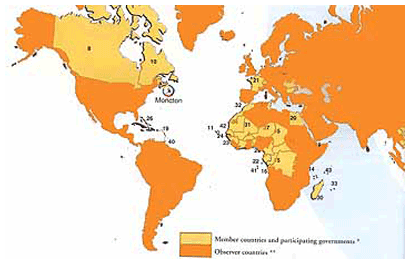|
Africa's
Francophone Community includes over 30
countries
by
Muguette Goufrani
 The
following is an interpretation of a recent
report by Mr. Duhamel, Secretary of State
for Canada: La Francophonie has
provided institutions to preserve the
French language around the world, to raise
awareness of our culture, to influence
world affairs, to bolster our economies,
to strengthen human security and to carve
out a place for us among the major
political blocs. La Francophonie gradually
took shape in the 1960s through
ministerial conferences, bringing together
various countries to discuss education,
culture or development. The
following is an interpretation of a recent
report by Mr. Duhamel, Secretary of State
for Canada: La Francophonie has
provided institutions to preserve the
French language around the world, to raise
awareness of our culture, to influence
world affairs, to bolster our economies,
to strengthen human security and to carve
out a place for us among the major
political blocs. La Francophonie gradually
took shape in the 1960s through
ministerial conferences, bringing together
various countries to discuss education,
culture or development.

Then
it started in 1970 in Niamey, Niger, with
the founding of the Agence de cooperation
culturelle et technique now known as the
Agence de la Francophonie. Canada was one
of the original members and continues to
play a leadership role. Since its first
Summit, held in Paris in 1986, La
Francophonie has become a valuable forum
for exchanges and political
dialogue.
Today
it consists of 52 states and governments
from five continents representing 500
million people, of whom 170 million speak
French. Other languages spoken in member
countries include, Arabic, Vietnamese,
Romanian, Flemish and a host of African
tongues. The diversity of cultures
constitutes an extraordinary source of
wealth, creativity and dynamic energy.
This is the perfect forum for collectively
dealing with the globalization-triggered
trends toward uniformity and homogeneity.
The programs of La Francophonie cover five
major areas: Democracy and development,
culture and communications; knowledge and
progress; economic development; and
international relations, including
cooperation with other organization such
as the United Nations, the Commonwealth
and the Organization of African Unity. La
Francophonie also organizes standing and
sectorial ministerial conferences,
including a conference of education
ministers and a conference of youth and
sports ministers.
Over
the years, La Francophonie has developed
specific tools for better promoting the
French language and spreading awareness of
the French-speaking world's cultural
diversity. A good example is the Montreal
based Agence universitaire de la
Francophonie with a membership of nearly
400 institutions of higher learning; its
aim is to foster French-language
scientific activities through research,
education and training (including distance
education), and the promotion of
French.
The
biggest success story is undoubtedly TV5;
this international French-Language
television network is a partnership
between Belgium, Canada, France,
Switzerland and several African countries.
TV5 is one of the world's largest
television networks and can reach nearly
100 million households in over 100
countries throughout the world. Last, the
Francophonie Games, first held in Morocco
in 1989, bring together French-speaking
youth from around the world for a
wonderful celebration of sport and
culture. The next Games will be held in
Canada's Ottawa-Hull region, from July 14
to 24, 2001. Some 2600 athletes and
artists will participate.
To
learn more about La Francophonie, visit
the Dept of Foreign Affairs and
International Trade site: www.dfait-maeci.gc.ca/foreignp/francophonie
Previous
summits: PARIS FRANCE- 1986; QUEBEC
CITY, CANADA - 1987 . DAKAR, SENEGAL -1989
CHAILLOT, FRANCE -1991; MAURITIUS -1993 ;
COTONOU, BENIN -1995 HANOI, VIETNAM -
1997; MONCTON, CANADA -
1999
Francophiles
in USA
The Director the FGTO in New York
discusses his country's tourism goals and
a new Agent specialist program.
By
Emily M. Inglesi
France
has been the focus of attention for many
famous writers and musicians over the
years, and itg is often considered the
birthplace of Liberty, spirit, elegance
and taste. So said Patrick Goyet, director
of the France Government Tourist Office
(FGTO,) AT A Media event on Feb 15,
highlighting the country's tourism goals
and products for 2001. The date also
marked the launch of the FGTO'S "Once Is
Not Enough" campaign, which encourages
repeat visitation.
There are
many Francophiles in America. There are
30.000 Americans who own residences in
France and spend holidays there. In
addition, we are paying special attention
to the youth market. French is the second
most popular foreign language for American
pupils, and we have 45,000 young people to
France each year, which is a nice piece of
the cake. We are always developing this
market and woking with the Association of
Teachers for Languages, and we have an big
exhibit in New York designed to target
this market. There are 10,000 French
teachers in the association.
Paris is
still the center of a certain intellectual
libertinage (free thinking) that is both
fascinating and irritating. Of the 30,000
travel agencies in the U.S. 14,000 are
selling France . We would like to have
certified groups of 2,000 to 3,000 travel
agencies that are very knowledgeable about
France and Africa. ICTA began developing
the workbook for the FGTO's specialist
program. We hope that in 2003 we'll have a
group of very reliable travel agents
to
Promote
France and Africa. We also plan to
organize fam trips in order for travel
agents to get to know the country better.
Benefits for travel agents include
receiving a mention and link on the FGTO
Website (www.franceguide.com) and in a
newsletter.
Resources
:
French
Government Tourist Office
US Headquarters
444 Madison Ave. 16TH Floor
New York NY 10022
E-mail info@francetourism.com
Website: www.franceguide.com
Fax: 212-838-7855
Phone: 212-838-7800
|
![]()
![]()